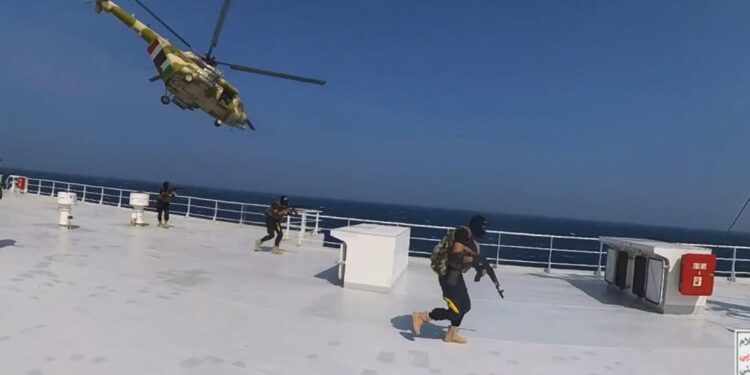3/16/2025–|Last update: 3/16/202509:40 PM (Mecca time)
Yesterday evening, the United States launched about 40 raids on Yemen, killing and wounding dozens. Washington considered that the raids come in defense of American interests, and to restore the freedom of maritime navigation. For his part, the military spokesman for the Ansar Allah group (the Houthis), Yahya Sari, said on Sunday that they targeted the American aircraft carrier “USS Harry Truman” as 18 missiles and a plane, describing the operation as quality.
Sari explained in a brief speech that the Houthi attack came “in response to the American aggression that targeted a number of Yemeni governorates with more than 47 air strikes, leaving dozens of martyrs and wounded.”
He stressed that the Houthis “will not hesitate to target any naval pieces in the Red and Arab Bahrain in response to the aggression.”
A US official stated that the American strikes against the Houthis in Yemen may continue for weeks.
In his justification for the raids launched by his country against Yemen, US President Donald Trump said in a post on “Truth Social” that no American trade ship crossed the Suez Canal, the Red Sea or the Gulf of Aden safely for more than a year. He added that it caused billions of dollars in losses to the global economy.
The threat of maritime navigation
The White House stated that the Houthi attacks have shifted almost 60% of the European Union ships to Africa instead of the Red Sea, and that the Houthi attacks on marine shipping since 2023 have caused a continuous negative impact on global trade and US economic security.
The Bab al -Mandab Strait, which Yemen, from the south, is one of the most important strategic marine corridors in the world. This strait links the Red Sea with the Gulf of Aden, and is a vital path of the oil and trade movement between Asia and Europe.
The following are the most prominent repercussions to close the strait:
- As part of its victory for Gaza, who has been subjected to continuous Israeli aggression since October 2023, the Houthis carried out several attacks targeting commercial ships and oil tankers in the Red Sea, which led to the disruption of maritime freight movement.
- These attacks prompted many companies to suspend the passage of their ships through the strait or take longer marine paths by heading towards the head of good hope, which increased the costs of shipping.
- With the increasing attacks that targeted Israeli ships or heading towards Israel, the costs of insurance on the crossing ships in the region increased significantly, which increased the financial burdens on commercial companies, and the matter worsened after the Houthis expanded the ban to include American and British ships because of their Houthi countries targeting air strikes during the past year.
- The threat of energy supplies, Bab al -Mandab is a major path for the transportation of oil from the rich Gulf countries to Europe and America. Any turmoil in this region may affect oil prices globally.
The importance of Bab al -Mandab
Bab Al -Mandab Strait is considered one of the most important marine corridors for the transportation of oil globally, as the average oil flows across the strait in 2023 amounted to about 8.8 million barrels per day. In 2024, oil flows witnessed a sharp decline of 54% during the first eight months, as the average decreased to about 4 million barrels per day until August, compared to 8.7 million barrels per day for the same period in 2023.
This significant decrease in 2024 is due to the escalation of attacks on ships in the region, prompting many shipping companies to avoid passing through the strait.
It is noteworthy that the Bab al -Mandab Strait ranks third in the world in terms of the volume of the energy trade that passes through it, after the Strait of Malaga and Hymes, which highlights its strategic importance in the global oil movement.
The Houthi group has launched more than 100 ships attacks from November 2023 until the end of the year 2024, which resulted in the sinking of two ships and the seizure of the “Galaxy Lider” ship (its crew was released today).
This prompted many major shipping companies in the world to change the path of their ships to sail around southern Africa instead of the Red Sea. This led to the loss of an additional charging energy estimated at at least 30% for the usual.



